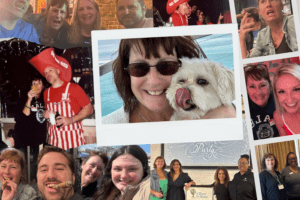
Senior mental health requires special care. The issue often gets overlooked, but over 20% of adults aged 60 and older suffer from a mental or neurological disorder, according to the National Institutes of Health. Learn some of the most common mental health issues facing seniors and how to support them through anxiety, depression, and social isolation.
Most Common Mental Health Issues in Seniors
Depression tops the list as the most common mental health problem in older adults, according to the Pan American Health Organization (PAHO). Other prevalent issues include anxiety disorders, dementia, and even psychosis. The National Institute on Aging also highlights that depression in seniors is often misdiagnosed as dementia, making it crucial you thoroughly talk through symptoms with your loved one and their doctor to get an accurate diagnosis.
Warning Signs of Anxiety and Depression
Senior depression can manifest differently than it does in younger individuals. For instance, it’s common for them to withdraw from social activities or lose interest in hobbies. Anxiety might look like excessive worrying, restlessness, or even physical symptoms like trembling. If you notice these signs, talk to your loved one’s doctor for proper diagnosis and treatment.
5 Tips for Maintaining a Healthy Mind
According to PAHO, two-thirds of seniors with mental health problems don’t get the treatment they need. Open communication is key. Encourage them to talk about their feelings and concerns. Here are some more tips to help your loved one keep a happy and healthy mindset.
- Stay socially connected: Encourage your loved one to maintain friendships and engage in social activities.
- Mindfulness and relaxation: Techniques like deep breathing and meditation can help reduce stress and improve overall mental well-being.
- Healthy diet: Nutrient-rich foods can have a positive impact on mental health. Omega-3 fatty acids, found in fish, are particularly beneficial to the brain and can reduce the risk of Alzheimer’s.
- Continue their hobbies: Hobbies such as games, art, or reading are great to get the mind going. They can create a sense of purpose for your loved one and put them in social situations. Research by the University of College London found that adults 50 years and older are 30% less likely to develop depression if they have a hobby.
- Regular sleep schedule: A study by the National Institutes of Health shows that inadequate sleep can increase the risk of dementia. Seven hours of sleep a night is considered sufficient.
Showing Support to Your Loved One
Supporting a senior with mental health issues can be challenging, but encouraging them to follow those five tips will help. Additionally, you can create a safe space for them to express their feelings. Open the communication line, listen to them without judgment, and offer emotional support. Help them engage in physical activity and have a social life. This can look like going on an afternoon walk with them or driving them to visit a friend. Loneliness exacerbates senior mental health issues.
At-Home Senior Care for Mental Health
At-home senior care services, like those offered by A Place At Home, can be a lifeline for your loved one. Caregivers can offer one-on-one emotional support and companionship, reducing your loved one’s feelings of isolation and worry. They can also help with medication management, ensuring that your loved one takes their prescribed treatments for health issues, including mental health. Plus, caregivers can help instill a daily routine. This allows your loved one to feel more in control and reduces their anxiety and stress from a lack of structure.
In-Home Care for Seniors with Autism
Senior care is not just for those with age-related conditions; it can also be tailored to support seniors with lifelong conditions like autism. While autism is generally diagnosed in childhood, seniors with autism require specialized care. Caregivers can provide personalized, structured routines and activities that cater to the unique needs of someone with autism, making their daily life more comfortable and less stressful. They can also plan activities designed to engage and stimulate them mentally.
A Place At Home Can Help
Senior mental health is a complex issue that requires a multifaceted approach. If you’re concerned about the mental well-being of your elderly loved one, consider the support that professional at-home care can offer. The A Place At Home experience is unique to you and your family. We provide specialized care individualized to your loved one’s unique needs, ensuring their mental and emotional well-being is taken care of. Find a location near you and take the first step toward a happier, healthier life for your loved one.






